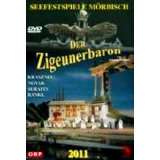|
Back
08/19/2015
Johann Strauss II: Der Zigeunerbaron
Daniel Serafin (Count Peter Homonay), Harald Serafin (Conte Carnero), Lucian Krasznec (Sándor Bárinkay), Evelin Novak (Sáffi), Monika Bohinec (Czipra), Wolfgang Bankl (Kálmán Zsupán), Iva Mihanovic (Arsena), Linda Plech (Mirabella), Gernot Heinrich (Ottokar), Zoltán Galamb (Pali), Michael Stark (Istvan), Mörbisch Festival Choir, Ballet and Extras, Bernhard Schneider (Chorus Master), Mörbisch Festival Orchestra, Manfred Mayrhofer (Conductor), Brigitte Fassbaender (Stage Director), Hannes Rossacher (Video Director), Wolfgang Fritz (Acoustic Designer), Brigitte Fassbaender, Rolf Langenfass (Set Designer), Armella Müller, Rolf Langenfass (Costume Designer), Friedrich Rom (Lighting Designer), Giorgio Madia (Choreography)
Recording: Bauernkapelle St. Georgen, Austria (2011) – 140’
Videoland Klassik #VLMD 018N – Booklet in German, English, Italian, Spanish and French – Subtitles in English, French, Italian and Spanish (Distributed by Naxos of America)

   
Next to Johann Strauss II’s 1874 couronnement d’opérette, Die Fledermaus, Der Ziegeunerbaron is regarded as a heavy favorite based on Mór Jókai’s novella, Sáffi (1883.) Strauss’ somewhat weighty synopsis has a musical diplomacy at the forefront by attempting to assuage the ongoing frictions that riddled the Austro-Hungarian Empire (1867-1918.) The second largest country next to the Russian Empire, this land was enriched with wildly differing cultures that lent itself as the perfect recipe to set Ignaz Schnitzer’s libretto to life. Directed by Brigitte Fassbaender, Strauss’ music is set ablaze with a lively and well-paced interpretation under Manfred Mayrhofer. As is with most of the Mörbisch output, this 2011 production is strong in both vocalization and acting, though the musical numbers get a bit befuddled.
The same can be said for the Gypsy trio: Lucian Krasznec, Evelin Novak and Monika Bohinec possess buttery tones, exhibit convincing characterization, never resort to insecurities, and their voices blend exceptionally well. Particularly engaging is Act II’s “Treasure Waltz”, although the buried cache doesn’t lie below (for those of literal-mindedness), but is, rather, idiosyncratically discovered by pulling off a tarp to reveal a locomotive. Having found the “find” within this ferrous mass, an ensuing "Anvil Chorus"-like chapter continues with a perplexing dismantling of the “Iron Rooster”... it looks more like an entrée into Lara Spencer’s Flea Market Flip.
Müller/Langenfass costuming facilitates the confounding plot with clear cultural delineations of opposing parties (i.e. Gypsies, Hussars and pig-herders.) Again, Giorgio Madia works his magic in the choreography department despite some of the corps' numbers (particularly closing Act II) looking a tad sloppy, possibly attributed to the garbs themselves. Geometrical acuities pocket with messiness and blur the vision. Conversely, the trademark “Madia swish”, compliments of the male contingency, adds a dash of paprika zest.
Der Zigeunerbaron isn’t of full-blown comical nature. Instead, it is one with increasingly militaristic gravity, yet adsorbed inside frivolous gilded edging of Acts II and III. The St. Georgen theatrics, nonetheless, allow a precious, pregnant moment for Harald Serafin by reading from his “Paragraphs of Ethics.” Lightly humorous, the part doesn’t evoke much chuckling.
Strauss gifts principals with small numbers, and in Der Zigeunerbaron there’s no exception. Iva Mihanovic is a fittingly pouty and obnoxious Arsena, Wolfgang Bankl’s Kálman Zsupán has blundering warmth in addition to Linda Plech’s great farcical inflections as Mirabella, the Governess. Daniel Serafin’s baritone sparkle sings avec brio inside the “Recruiting Song.”
This Der Zigeunerbaron fuels Strauss’ dizzying storyline by failing to invest in more concise character nuances and understandable blocking. This loses the umbrella of congealment. Set aside faint ambiguities, the production is well recorded with superb sound quality.
Christie Grimstad
|